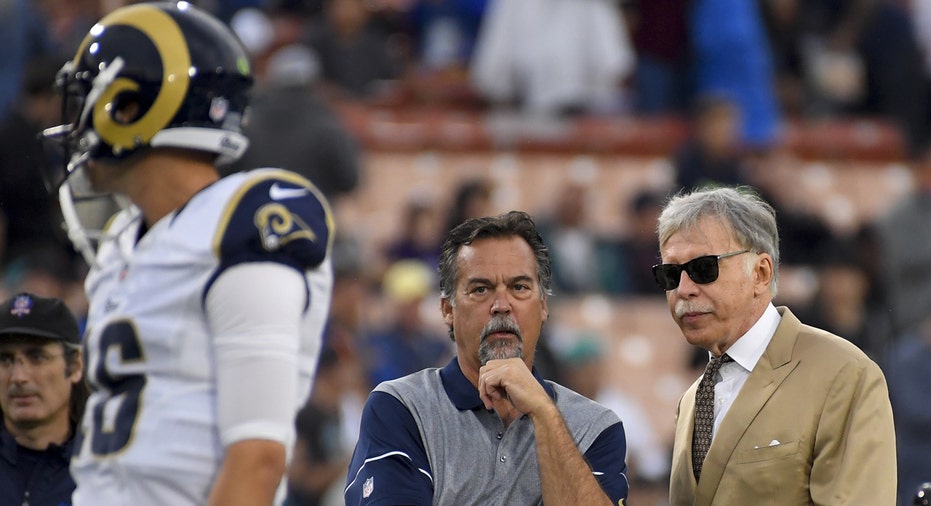St. Louis' NFL Lawsuit Could Open Legal, PR Floodgates

The city of St. Louis’ lawsuit this week against the NFL and its 32 teams over the Rams’ move to Los Angeles could trigger alarm bells for league officials that approved three controversial franchise relocations in the last two years.
About 15 months after losing the Rams franchise, St. Louis officials say the NFL violated its own standardized relocation guidelines and breached its contract when it approved the team’s move. The city has asked a St. Louis court to compel the NFL to hand over its profits from the relocation, and to award punitive damages to make up for lost revenue.
The NFL also approved relocations for its Raiders and Chargers franchises within the last year – much to the chagrin of fans and officials in their respective home cities of Oakland and San Diego. If St. Louis’ case against the league and its team owner proceeds to trial, the legal and PR fallout from the suit could extend far beyond Missouri, according to Richard Roth, a New York-based sports attorney.
“The case will hinge on the club's motion to dismiss,” Roth told FOX Business. “If it is granted – and it may not be – then there will be little damage to the NFL's image as, typical of other lawsuits against the league, the suit will come and go. If, on the other hand, the motion is denied and the suit continues, antennas will go up with not only the league but the Chargers and Raiders organizations.”
Officials in St. Louis claim the loss of the Rams cost the city more than “$100 million in net proceeds,” including up to $3.5 million in annual amusement and ticket tax revenue and roughly $7.5 million in property taxes. The filing points to the rising value of the Rams’ franchise, which Forbes said doubled in value to $3 billion after the move, as well as the $500 million relocation fee the Rams paid to the other 31 owners, as proof that league officials improperly benefitted.
“The Rams, the NFL, through its member teams, and the owners, have violated the obligations and standards governing team relocations by seeking and approving the relocation of the St. Louis Rams from St. Louis to Los Angeles, California, despite the fact that the Rams failed to satisfy the obligations imposed by the League’s relocation rules and the fact that relocation was not supported by the required statement of reasons or the adopted relocation standards. In so doing, Defendants have breached their contractual duties owed to Plaintiffs,” the lawsuit says.
The NFL established its current relocation guidelines in 1984. Under the rules, teams interested in a move must “work diligently and in good faith to obtain and to maintain suitable stadium facilities in their home territories, and to operate in a manner that maximizes fan support in their current home community."
The suit alleges the NFL’s actions during the Rams’ relocation bid violated this standard. The filing lists several instances in which league and team officials, including Rams owner Stan Kroenke, allegedly made false statements about their intention to keep the franchise in St. Louis.
“There is no legitimate basis for this litigation. While we understand the disappointment of the St. Louis fans and the community, we worked diligently with local and state officials in a process that was honest and fair at all times,” NFL spokesman Brian McCarthy said in a statement.
Representatives for the Los Angeles Rams declined to comment.
Negotiations between the NFL and St. Louis broke down in late 2015 after league officials expressed dissatisfaction with St. Louis’ proposed plans for a new stadium. The league’s 32 owners approved the Rams’ move to Los Angeles in January 2016.
Officials in Oakland and San Diego were critical of the NFL’s decision to relocate their teams in recent months, though neither city has attempted legal action to date.
Roth, who noted that there is no clear precedent for the suit, said St. Louis officials would have to prove the NFL did not “work diligently” to find a solution in the local market, despite their best efforts.
“The City and local government are claiming that the club failed to work diligently with the municipality, as they had done everything the club had asked for; namely, agreeing to a new stadium, finding a way to finance it and responding to each of the club's demands. If that is the case, then the club did breach its guidelines, providing the municipalities with potential damages,” Roth said.
However, any legal victory would likely be more symbolic than a source of financial reward. If the case proceeds to trial, the plaintiffs would have to convince the court that their claims of financial harm are warranted.
“Damages…are a very tricky issue. They are not easy to prove and may very well be speculative,” Roth said.



















